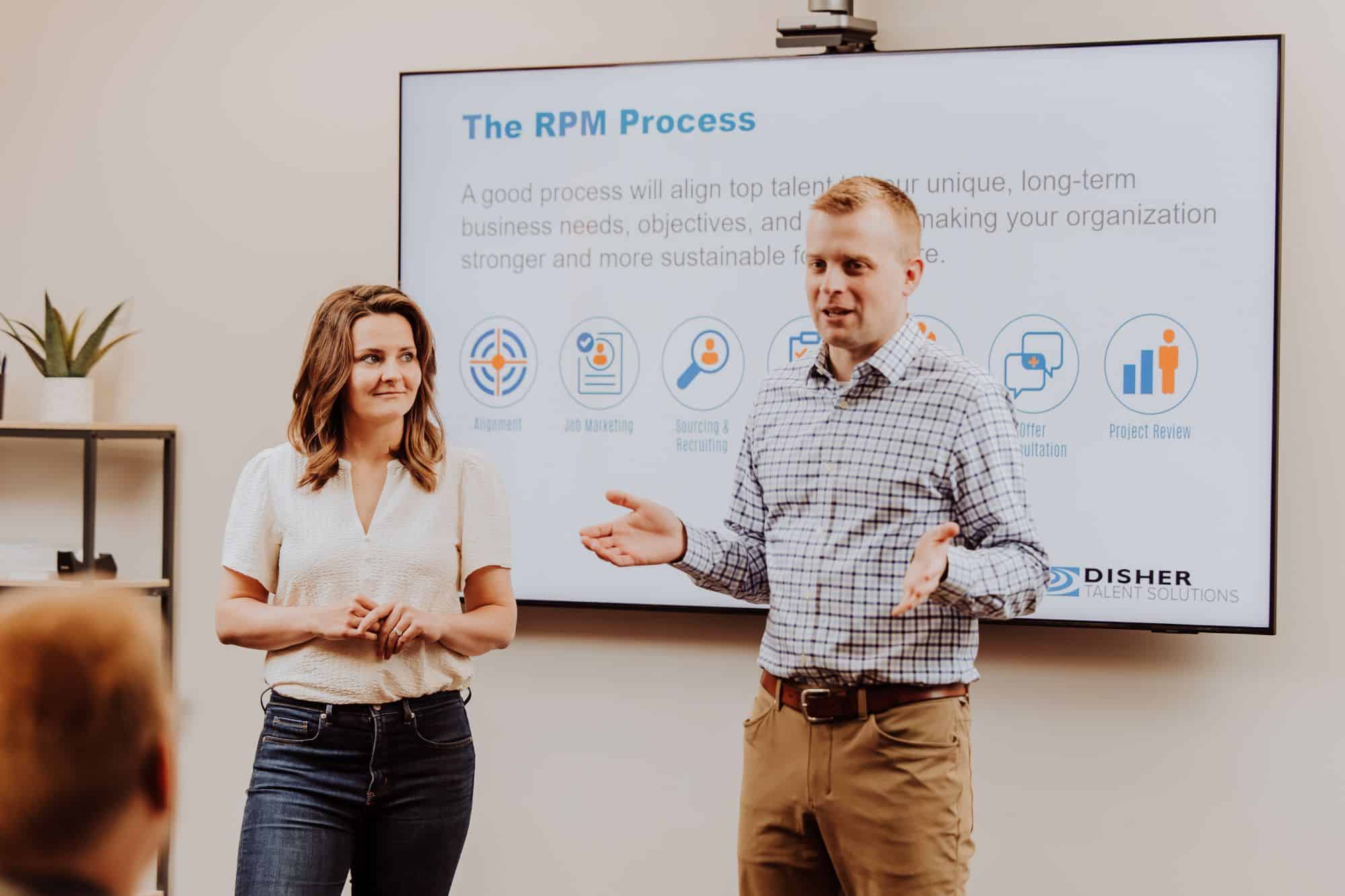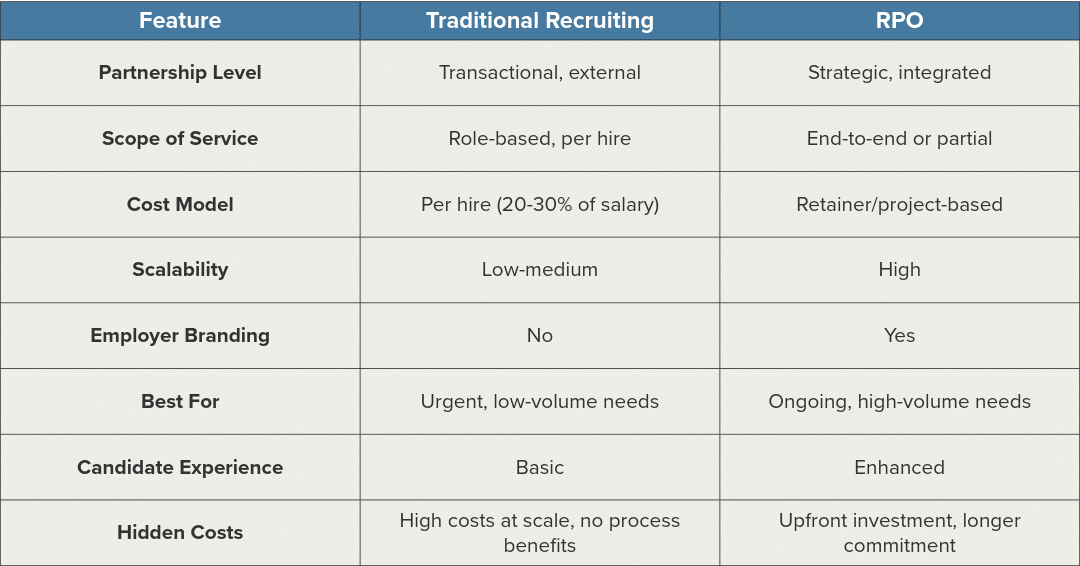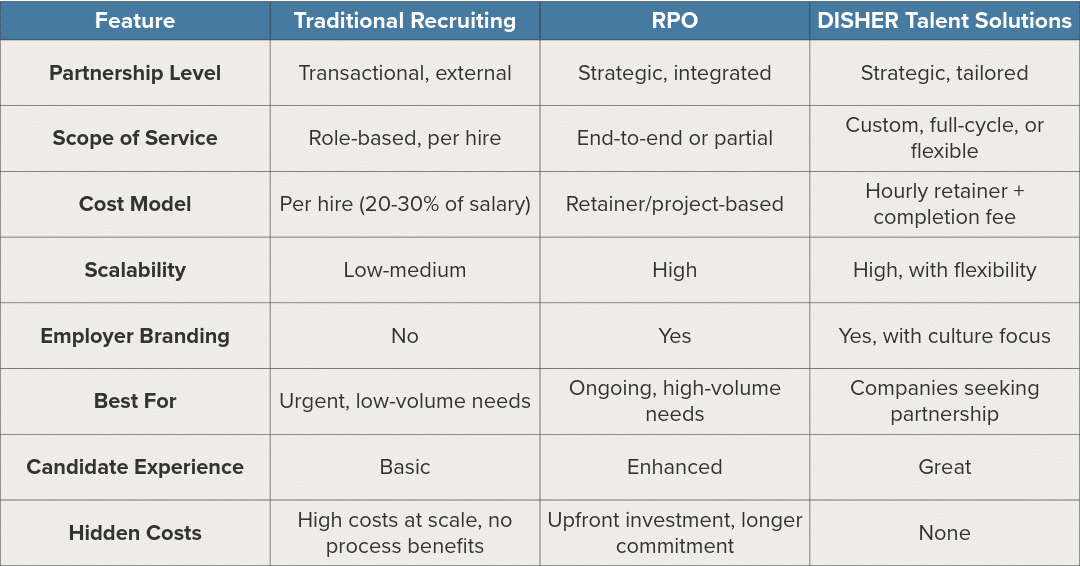Recruitment Process Outsourcing (RPO) vs. Traditional Recruiting: Which Is Right for Your Hiring Needs?
June 9, 2025

Hiring mistakes are expensive. Choosing the wrong external recruiting approach can cost you time, money, and the trust of your team. If you’re evaluating traditional recruiting agencies or recruitment process outsourcing (RPO), you may be wondering: what’s the real difference, and which one will actually solve your hiring headaches?
In this post, you’ll get honest answers to the questions HR leaders and hiring managers ask most, like:
- How traditional recruiting agencies work
- How RPO works
- How DISHER Talent Solutions compares as a third option
- When each model makes sense
- Key questions to ask before choosing a partner—regardless of model
Let’s clear up the confusion so you can make an informed choice for your company.
How Traditional Recruiting Agencies Work
Traditional recruiting agencies are hired to fill specific roles, often on a per-hire basis. They maintain their own candidate pools and focus on finding talent fast, typically for immediate or short-term needs.
Their process is typically straightforward: you provide the job description, they source and screen candidates, and then they send you a shortlist. Once a hire is made, they step back. Their success is measured by placements, not by long-term partnership or process improvement. Their pricing models are based on this as well, making for a very transactional relationship.
Key Characteristics
- Focus: Speed and placement
- Relationship: Short-term, transactional
- Success Metrics: Number of placements
- Cost Structure: 20-30% of the candidate’s first year salary
Based on these characteristics, traditional recruiting agencies work best for companies who have urgent yet low-volume or sporadic hiring needs.
How Recruitment Process Outsourcing Works
RPO agencies do not operate like any other staffing firms. They act as an extension of your HR team, taking on all or part of your recruiting process. This means they can handle everything from sourcing and screening to interviewing, scheduling, and onboarding—often under your company’s brand and with your values in mind.
They bring their own recruiters, technology, and proven processes to the table. This usually means they’re interested in a longer-term, more strategic partnership.
Key Characteristics
- Focus: Long-term talent strategy
- Relationship: Strategic, long-term partnership
- Success Metrics: Quality of hire, process improvements, time-to-fill
- Cost Structure: Monthly retainers, project fees, or cost-per-resource
Based on these characteristics, the RPO model usually works best for companies that prioritize long-term talent acquisition strategy and have consistent, high-volume hiring needs.
RPO vs. Traditional Recruiting: Pros & Cons

A Third Option: How DISHER Talent Solutions Compares
Wondering why you can’t have the best of both worlds with an external recruiting partner? We did too. That’s why DISHER Talent Solutions was founded.
Our model is close to the RPO model, but with some added flexibility. Our hybrid approach blends the strategy and integration of RPO with the customization and responsiveness of a boutique agency.
Key Characteristics
- Focus: Technical recruiting and long-term talent strategy
- Relationship: Flexible strategic partnership
- Success Metrics: Quality of hire, process improvements, time-to-fill
- Cost Structure: Hourly rate + completion fee
We tailor your services to your needs, acting as an extension of your team. Many times, our clients come to us after trying the traditional and RPO models and not getting the results they need. They stick with us because we’re able to offer them:
- Customizable support (full-cycle or specific stages)
- Deep cultural alignment with your company
- Employer branding support and enhanced candidate experience
- Data and insights to improve long-term strategy
- Transparent hourly pricing model + one-time completion fee
Learn more about our process >>
When Should You Choose Each Model?
We stand by our model and have seen it work wonders for many organizations, but it’s not for everyone. Here’s an honest picture of when we recommend using each of the models we’ve talked about.
- The DISHER Talent hybrid model is best if you want a long-term talent partner that’s flexible, transparent, and improves your employer brand and candidate experience.
- The RPO model is best for companies with consistent, high-volume hiring needs and that value a strategic partnership. Just be cautious of long-term contracts you can’t get out of.
- The traditional model is best for companies with minimal hiring needs. You might not be looking for a long-term partner right now because you don’t need it, and that’s okay.
Questions to Ask Before Choosing a Recruiting Partner
No matter which model you choose, ask these questions:
- How do you measure success and report results?
- What tools and technology do you use?
- How do you represent our brand to candidates?
- What’s your pricing structure—and what’s included
- Can your team scale with us as our needs evolve?
- Do you have client stories or case studies to share?
Final Comparison: Traditional vs. RPO vs. DISHER Talent

Ready to Make the Right Hiring Choice?
Choosing an external recruiting solution isn’t just about cost. It’s about finding a partner who will help you build the team you need for long-term success. Now that you know the real differences, strengths, and trade-offs, you’re ready to move forward with confidence.
If you want a recruiting partner who puts your goals first and brings real expertise to the table, start a conversation with us. Let’s build your best team—together.




